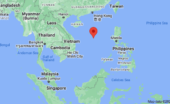Johannah Bernstein post: "eternally proud of my father’s extraordinary aeronautical engineering. legacy. here is a photo of the Canadair Water…
Wednesday Night #1750
Written by Diana Thebaud Nicholson // September 16, 2015 // Wednesday Nights // Comments Off on Wednesday Night #1750
The week started with a bang – the news that Australian PM Tony Abbott had been ousted by an internal party vote. It seems that in Australian politics, members of a political party can attempt to ambush a leader with a sudden request to “spill” – or declare vacant – the leadership. His replacement is Malcolm Turnbull, a moderate who supports same-sex marriage and strong action on global warming, So Stephen Harper loses one of his international allies [The Tony Abbott and Stephen Harper mutual admiration society].
Meantime, Mr Harper could rejoice in the news of the surprise (probably not to him) surplus of $1.9 billion which has set the proverbial cat among the pigeons just ahead of Thursday’s debate on the economy. Unsurprisingly, as the Globe & Mail remarks: Mr. Harper seemed pleased to be talking about fiscal issues after days of being on the defensive over his government’s approach to refugee policy. The Conservative Leader used the figures to attack the policies proposed by the Liberals and NDP. Tom Mulcair is also happy as he can now peg some of his spending plans on the surplus and better-than-expected revenues. Not surprisingly, Justin Trudeau, after a shaky initial reaction (if you believe Sun Media) to the news called the surplus “political,” and accused the Conservatives of balancing the books on the backs of some of the most needy Canadians before the Oct. 19 election. Federal departments left $8.7 billion unspent last year (The Ottawa Citizen). Kevin Page said it’s positive news that the books are back in balance, but said the details on the real source of the surplus – “Did we hold back on spending for veterans? Did we hold back on spending in defence? Did we hold back on spending for food inspection agencies? What’s the impact on service levels?” – won’t be known until the public accounts are tabled in November. Too late for campaign debate, of course. However, we anticipate some good discussion with Tyler Meredith about the economic issues of the election campaign along with his research at IRPP on Skills & Labour Market Policy and The Faces of Aging program.
While in general there is encouraging news from Monday’s meeting of the European Council [EU Countries Struggle To Reach Consensus On Refugee Relocation — “A majority of the member states are ready to move forward but not all of them.”], there is one disturbing sentence in the World Post report: “Bernard Cazeneuve, France’s interior minister, added that the EU should also work to create a mandate to deport economic migrants — those who aren’t genuinely fleeing war or persecution.” We are concerned that those fleeing the effects of climate change, e.g. drought, starvation (Migrant crisis: “If we don’t stop climate change, then what we see right now is just the beginning”) may now be excluded from the definition of refugees. While Europe is attempting to cope with the overwhelming number of refugees/asylum seekers, there is increasing criticism of the wealthy Gulf States [Migrant Crisis: Where Have the Gulf States Been?
Why a region with $2 trillion in annual income can’t seem to spare much for the neighbors] . Writing for Al Jazeera, Afzal Ashraf points out that “the apparent failure of Muslim governments to look after fellow Muslims is being exploited by extremists’ propaganda. On various social media posts, they allege this is further evidence of current Muslim rulers’ “apostasy” and disdain for the “ummah”, arguing that only their Islamist state or caliphate can provide for Muslims’ welfare. Whatever Western countries do for the refugees, it will only be a sticky plaster solution. The number of refugees is already too large for a viable resettlement programme outside the region. The rate of the flow from current conflicts and the likely new sources from the Libyan and Yemeni wars could transform the crisis into a catastrophe in the months to come.” [Refugee crisis: Where are the Gulf countries? – The humanitarian crisis raises questions about the nature of politics and leadership in the Arab and Muslim world.]
Saudi Arabia’s somewhat laughable response to criticism that it Takes Zero Refugees Despite Having 100,000 Tents Able To House 3 Million People , has been to offer to finance the building in Germany of 200 mosques – one for every 100 refugees who arrived last weekend. However, it lends a modicum of credence to the chilling suggestion that the flood of refugees constitutes Hijrah, or jihad by emigration.
In Canada, the debate over admission of refugees continues. While there may be some genuine concerns over security and the (temporary) impact of large numbers of refugees on the economy, it is evident from the vitriolic posts on numerous social media that not all our fellow citizens are as generous as we might like to think. Our friend John Moore, host of Toronto’s Newstalk 1010, recently offered this reminder:
The new none is too many? – Europe’s migrants only the latest to be “trouble”
“To be sure, some newcomers do bring their old country troubles with them. We all march in the St Patrick’s Day Parade now, but we forget about The Fenians and the assassination of Darcy McGee. A Sikh committed Canada’s worst ever terrorist act in the bombing of Air India. But most newcomers are so excited to be in one of the safest most glorious country in the world that their first order of business is to get a job, swear citizenship and raise Canadian kids.”
Ron Atkey addresses the question Syrian refugees: Are they really a threat to Canadian security? and based on his experience leading the Indochinese refugee program, suggests some practical procedures that would eliminate most, if not all, security concerns.
However, as Nicholas Kristof writes: Compassion for Refugees Isn’t Enough
“If you have a heart, you’re moved by the refugees. But if you have a head, you also know that welcoming them in Germany won’t resolve the crisis.
There are 60 million people displaced worldwide, and more will now be willing to board flimsy boats to cross the sea.
… above all, let’s address the crisis at its roots, particularly in the Middle East.
One essential step is to improve conditions for the 3.7 million Syrian refugees in Lebanon, Turkey and Jordan. The World Food Program was just forced to cut 229,000 refugees in Jordan off food rations because it ran out of money, and if the world won’t pay for refugees to eat in Jordan, it will have to feed them in the West.
Then there’s the far more difficult task of trying to make Syria habitable again.”
Having watched all FOUR of the Mansbridge interviews, we came away more impressed with Elizabeth May than the other 3 together. She is articulate, cordial but not smarmy, and realistic about the role the Green Party could and should play. She is above all very intelligent.
To their credit “Back in May, the Liberals said they believed traditional nationally televised broadcast debates were the best to reach the most Canadians. They said they wanted to see an equal number of English and French debates … Liberals also wanted all party leaders represented in the House of Commons, such as Green Party Leader Elizabeth May and Forces et Démocratie Leader Jean-François Fortin, to take part.”
If Trudeau and Mulcair refused to participate in non-inclusive debates, they would be applauded. So why don’t they try for a principled stance? Possibly for the same reasons as Stephen Harper [Four reasons why Stephen Harper won’t debate Elizabeth May].
The Globe & Mail is hosting the next leaders debate on Thursday, Sept. 17 at 8 p.m. ET. Elizabeth May will not be a participant and the voters are the poorer.
We are looking forward to hearing Alan Hustak‘s views on the election campaign and particularly what he learned during his summer sojourn in Saskatchewan.
Other news
Russia is taking an expanding -and, to many, disquieting- interest in Syria, prompting the question Could Syria be Putin’s Afghanistan?. According to an interview with Former Finnish president and Nobel peace prize laureate Martti Ahtisaari published in Tuesday’s Guardian, the Syrian crisis could have been avoided – West ‘ignored Russian offer in 2012 to have Syria’s Assad step aside’
Singapore‘s ruling People’s Action Party elections have come and gone. The only surprise was the even stronger than anticipated victory by the ruling People’s Action Party. However, there are some rumblings that the city-state is a place of growing disquiet
We have not heard much lately about Chrystia Freeland, one of the early star candidates handpicked by Justin Trudeau. At least, not since she crashed the the Toronto men-only club . However, we recently came across this review by Donald Johnston of her book Plutocrats: The Rise of the New Global Super-Rich and the Fall of Everyone Else and thought it might be of interest.
For those who have been following the excessive sensitivities of students raised by The Atlantic in The Coddling of the American Mind, in May, the Washington Post featured a story Columbia students claim Greek mythology needs a trigger warning, that cites numerous demands from a variety of academic institutions. We gave up when we read that “Some have called for trigger warnings for television shows such as … ‘Downton Abbey.’”. Even if these susceptible individuals are shielded from any newscasts, how do they survive in a world of violent video games, not to mention such acclaimed entertainment as Game of Thrones and Hunger Games, reality TV and Donald Trump?



